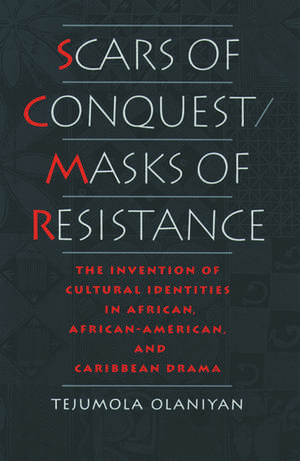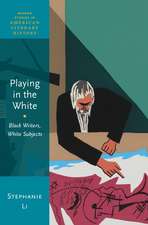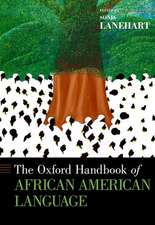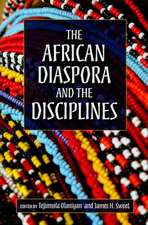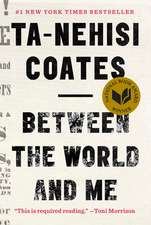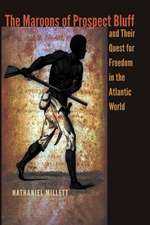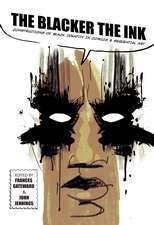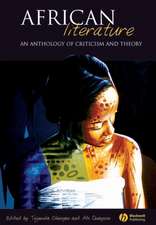Scars of Conquest/Masks of Resistance: The Invention of Cultural Identities in African, African-American and Caribbean Drama
Autor Tejumola Olaniyanen Limba Engleză Paperback – 24 aug 1995
| Toate formatele și edițiile | Preț | Express |
|---|---|---|
| Paperback (1) | 422.10 lei 32-37 zile | |
| Oxford University Press – 24 aug 1995 | 422.10 lei 32-37 zile | |
| Hardback (1) | 509.01 lei 32-37 zile | |
| Oxford University Press – 24 aug 1995 | 509.01 lei 32-37 zile |
Preț: 422.10 lei
Preț vechi: 521.16 lei
-19% Nou
Puncte Express: 633
Preț estimativ în valută:
80.77€ • 84.78$ • 67.04£
80.77€ • 84.78$ • 67.04£
Carte tipărită la comandă
Livrare economică 31 martie-05 aprilie
Preluare comenzi: 021 569.72.76
Specificații
ISBN-13: 9780195094060
ISBN-10: 0195094069
Pagini: 208
Dimensiuni: 169 x 230 x 14 mm
Greutate: 0.33 kg
Editura: Oxford University Press
Colecția OUP USA
Locul publicării:New York, United States
ISBN-10: 0195094069
Pagini: 208
Dimensiuni: 169 x 230 x 14 mm
Greutate: 0.33 kg
Editura: Oxford University Press
Colecția OUP USA
Locul publicării:New York, United States
Recenzii
An excellent job and...a must for students of African Literature.
This book is destined to elevate comparative research on African Diaspora drama out of the sub-basement of scholarship. Olaniyan literally performs this transformation by his choice of authors, carefull attention to texts, and criticism informed broadly by a rich dialogue among contemporary cultural and literary theorists.... The argument is presented forcfully, at times eloquently, with a turn of phrase likely to be quoted in the future by other scholars.
A long overdue and very successful comparaitve approach to several of the most important contemporary Black playwrights. Scars of Conquest/Masks of Resistance offers a fascinating, ambitious, and challenging reading of modern pan-African drama as a specific conceptual formation and cultural practice. Drawing on a variety of contemporary critical languages, but equally conversant in the contestatory idioms of Negritude writers, Fanon, and their inheritors, Olaniyan illuminates not only the convergence of competing discourses and historical pressures that helped shape a distinctive pan-African theater, but forces reconsideration of the drama's ambiguous" stagings of anticolonial and "post-Afrocentric" aspirations. Olaniyan's attention to subtle inflections of language and genre produce stimulating and persuasive readings of individual plays, and form the core of his vision of Black drama as an endless "reinvention" of postcolonial identities..
The publication of this book marks the emergence of a major new intellect in the field of post-colonial studies.
This book is destined to elevate comparative research on African Diaspora drama out of the sub-basement of scholarship. Olaniyan literally performs this transformation by his choice of authors, carefull attention to texts, and criticism informed broadly by a rich dialogue among contemporary cultural and literary theorists.... The argument is presented forcfully, at times eloquently, with a turn of phrase likely to be quoted in the future by other scholars.
A long overdue and very successful comparaitve approach to several of the most important contemporary Black playwrights. Scars of Conquest/Masks of Resistance offers a fascinating, ambitious, and challenging reading of modern pan-African drama as a specific conceptual formation and cultural practice. Drawing on a variety of contemporary critical languages, but equally conversant in the contestatory idioms of Negritude writers, Fanon, and their inheritors, Olaniyan illuminates not only the convergence of competing discourses and historical pressures that helped shape a distinctive pan-African theater, but forces reconsideration of the drama's ambiguous" stagings of anticolonial and "post-Afrocentric" aspirations. Olaniyan's attention to subtle inflections of language and genre produce stimulating and persuasive readings of individual plays, and form the core of his vision of Black drama as an endless "reinvention" of postcolonial identities..
The publication of this book marks the emergence of a major new intellect in the field of post-colonial studies.
